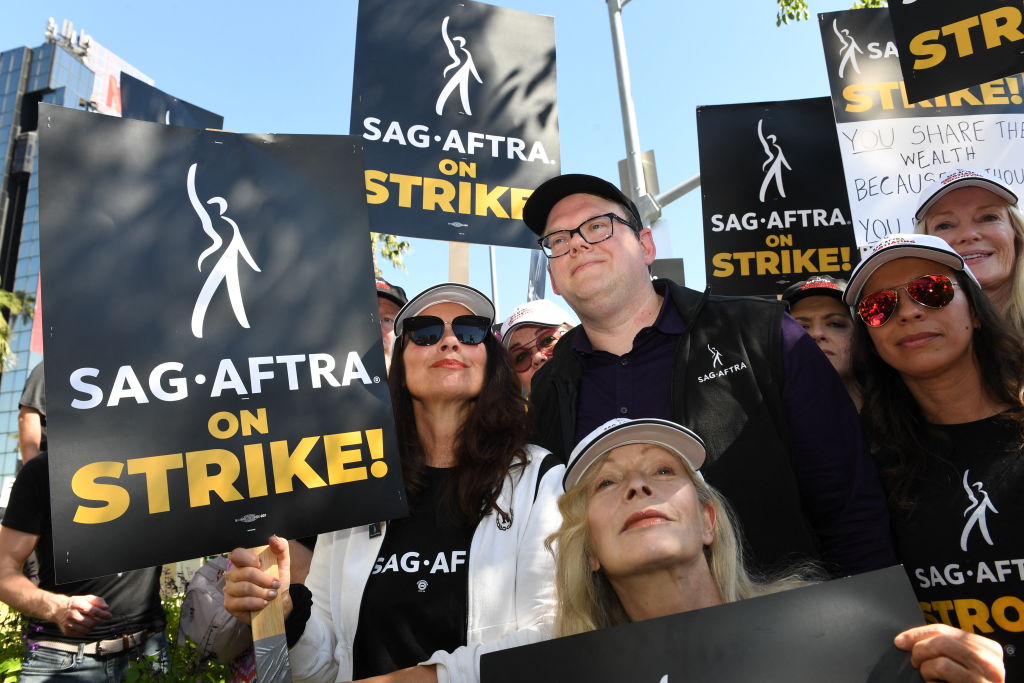Hollywood Writers and Actors Are Striking to Make Globalization Work for Them
Globalization has upended film and TV, creating more jobs, but ones that are worse-paid and more precarious. Like UPS Teamsters did with their strike threat, striking Hollywood workers are seeking to make their industry's global reach work for them.

SAG-AFTRA president Fran Drescher with national executive director and chief negotiator, Duncan Crabtree-Ireland, join Writers Guild members at a picket line outside Netflix in Los Angeles on July 14, 2023. (Valerie Macon / AFP via Getty Images)
This summer organized labor is on the offensive, with more unity and determination than we have seen in two generations. In Los Angeles, New York, and elsewhere, more than 10,000 writers and 160,000 actors are on strike, seeking to make Hollywood’s global reach finally work for them. It’s the first strike against film and TV companies in forty-three years.
Their concerns are remarkably similar to those of the 340,000 Teamsters who work at United Parcel Service (UPS), where the union achieved an historic wage and working conditions victory just days before an August 1 strike deadline.
The Hollywood studios and big logistics companies like UPS and Amazon are global entities whose revenues steadily rose even before the pandemic sent them soaring. All over the world home-bound customers splurged on both packaged goods and televised entertainment, the latter increasingly delivered by Netflix, HBO, Amazon, or one of the other streaming companies. During the last three decades, employment just about doubled in the film industry and in the transportation and warehousing sector.
But employment growth has not been accompanied by either job or income security. Top managements in the United States have sought to deploy all the technological wizardry coming out of Silicon Valley to slice and dice the labor of employees so as to create a “flexible” work regime — displacing the cost of an unpredictable demand for labor from the corporate balance sheet onto the shoulders of the workers who provide the service. Uber, Lyft, and the other app-based employment platforms have done much to perfect this contingent work regime, with UPS and Hollywood trending in the same direction.
The unions are fighting back. The Teamsters have been energized by a reform slate that swept into office twenty months ago. At UPS this year, the union was clearly prepared to strike in order to dramatically raise the wages of all UPS Teamsters, especially those part-time warehouse employees who constitute more than half the UPS workforce.
In a tentative agreement that members will vote on through August 22, these workers won an immediate wage increase of at least $2.75 per hour, with seventy-five hundred of them transitioning to a new set of full-time jobs. The part-timers wanted $25 an hour, and all the current ones will get there through general wage increases amounting to at least $7.50 over the life of the five-year contract. For some workers that amounts to a nearly 50 percent increase in pay. And the tentative agreement contains a lot of other things that will materially improve their lives on the job.
The Teamster victory establishes a new standard that will ripple through the rest of the logistics industry and constitute a powerful argument that employees at Amazon, Walmart, and elsewhere should also organize under the union banner.
Like UPS and Amazon, Hollywood is part of a global supply chain, with 70 percent of its revenue coming from abroad, East Asia in particular. There is more work for actors and writers, but globalization has disrupted the old order. Today, many Hollywood blockbusters are designed with a non-English-speaking audience in mind; there are plenty of heavy action sequences, with the dialogue simplified for easy dubbing and subtitling.
Meanwhile the proliferation of streaming platforms has created more work for writers, but the owners of this new entertainment technology have gone to war with the traditional way actors and writers won a measure of income security. Some of these platforms, like Apple, Netflix, and Amazon Prime, are products of Silicon Valley and its libertarian, anti-union business culture.
To keep and hold audience attention in a highly competitive market, these streaming platforms contract for shows with but a handful of episodes, instead of the multiyear series of just a dozen years ago. This keeps writers and actors continually scrambling for new work and also limits the opportunities workers had to move up into producing and directing.
Writers and actors are also on edge because of the threat poised by studio deployment of artificial intelligence. The writers fear it will degrade the script-making process while many actors worry that AI has the potential to capture and manipulate an actor’s image, thus threatening an Orwellian future unless the Screen Actors Guild – American Federation of Television and Radio Artists (SAG-AFTRA) wins a set of well-defined guardrails protecting their personae.
Episodic employment has always been characteristic of Hollywood, but in the old days, writers and actors could rely on an additional income stream — residuals — resulting from the continuing, years-long popularity of a film or TV series. These were won by the talent guilds in battles that stretch back to the 1950s. Studio executives have long chafed that this slice of the profits goes to the workers. As one of them put it, “I don’t pay my plumber every time I flush my toilet.”
But the new streaming platforms make their money by selling subscriptions to household viewers. They pay the talent a fee based on the level of those subscriptions, not the success of the show. Payments have been sharply lower than in the old system.
All this has created a crisis atmosphere in Hollywood, but this time militancy has replaced despair. As Fran Drescher, SAG president, put it, “If we don’t stand tall right now, we are all going to be in trouble, we are all going to be in jeopardy of being replaced by machines.”